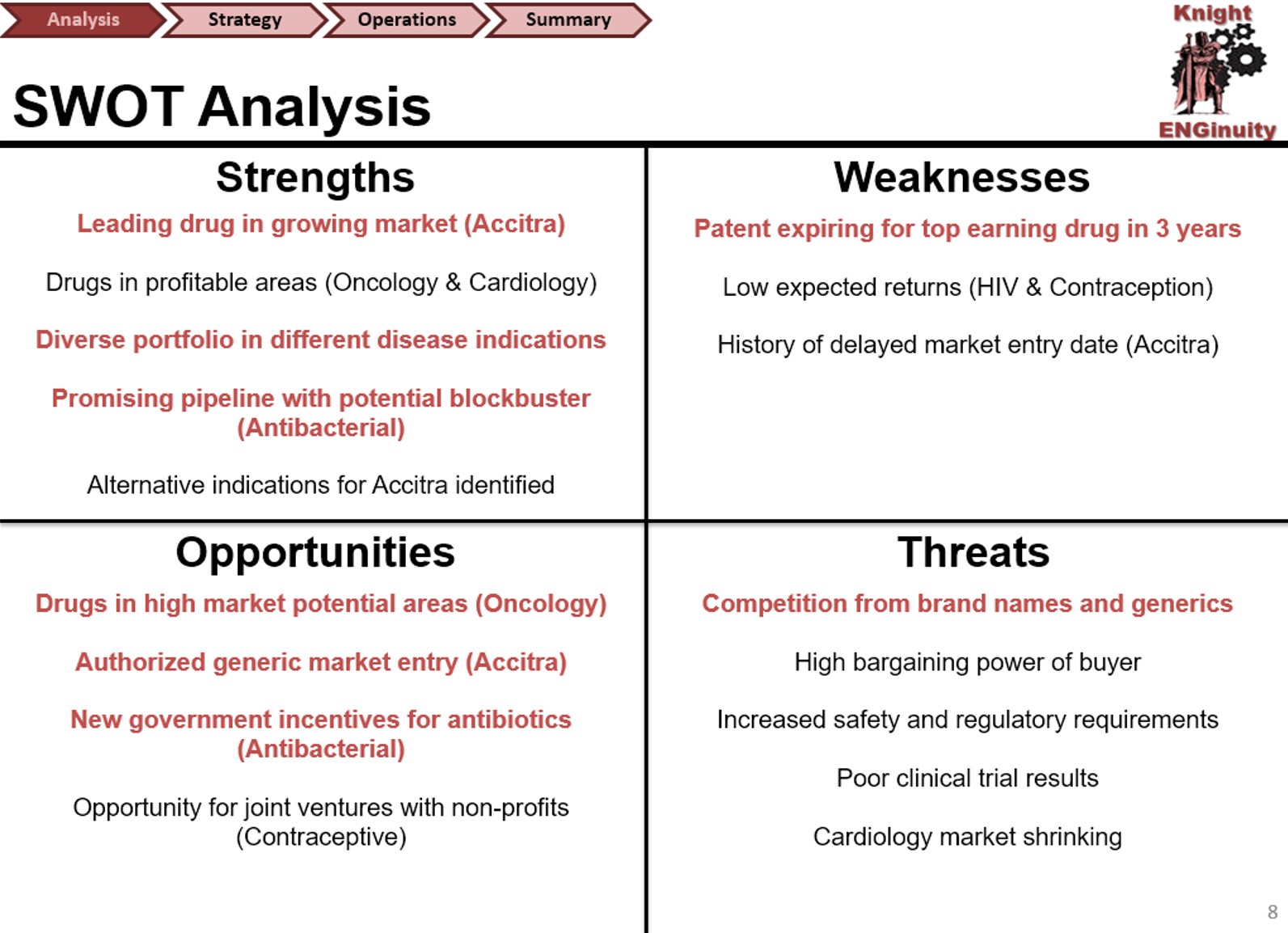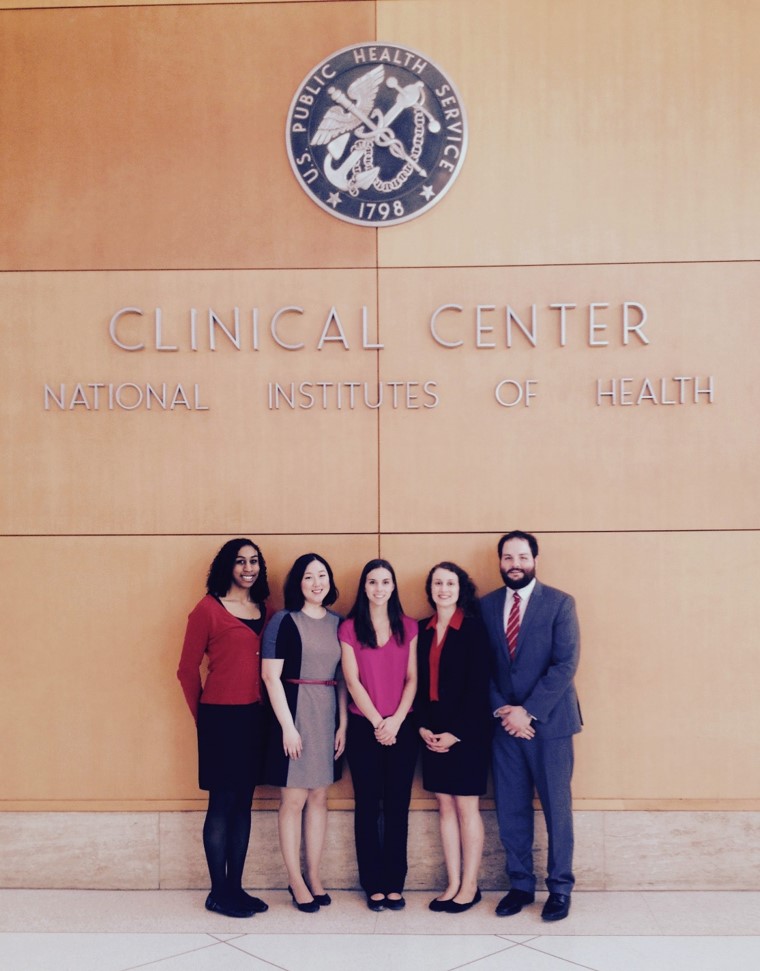By Chris Lowe and Sarah Misenko
This post is part 2 of an article on our team’s experience in a management consulting case competition. To read part 1 click here
Claricure had a well-diversified portfolio with drugs crossing seven different indications. While this was a strength to the company, it necessitated a broad market analysis of each of the seven drugs before we could start to address the other moving parts in the case. Specifically, we looked to identify “proxies” for each of the products within Claricure’s portfolio, essentially similar products that were on the market that we could use as a model to form our projections. We also knew we needed to keep an eye out for other factors that could affect the profitability of our portfolio drugs, such as government incentives and competing products. With our market information for each drug in hand, we performed a SWOT analysis to help form our strategy. We identified several strengths of Claricure’s portfolio: (1) Accitra is a top earning drug in a growing diabetes market, (2) Claricure’s portfolio is diverse with 7 different indications, and (3) the antibacterial drug under development is likely to reach blockbuster status. We elected to leverage these strengths in an effort to take full advantage of existing opportunities (growing oncology market, government incentives for antibiotics) while simultaneously marginalizing weaknesses (looming patent expiry) and threats (competition from generics) that we identified in our SWOT analysis.
[caption id="attachment_376" align="alignnone" width="1593"] Our SWOT analysis identified several key factors affecting the profitability of Claricure's portfolio.[/caption]
Our SWOT analysis identified several key factors affecting the profitability of Claricure's portfolio.[/caption]
Based on all of this analysis and information, the major points of our strategy recommended a reallocation of the budget in support of the following:
- Fully support Accitra sales over the next three years to maximize revenue prior to patent expiry
- Launch an authorized generic version of Accitra to coincide with patent expiry
- Increased marketing and support of the oncology drug in the face of huge projected market growth for oncology drugs industrywide
- Throw full support behind development of antibacterial drug to take advantage of government incentives for antibiotic development (including extended patent exclusivity) and potential blockbuster status
Having prepared our strategy and presentation over the course of a week, we were all anxious to see what awaited us on the day of competition and how our strategy stacked up against other teams who frequented these types of events. When our presentation time arrived that morning, we presented our case to two practicing management consultants and fielded their many questions to defend our strategy. While we waited for the preliminary results to be announced, we networked with some of the other teams, as well as representatives from consulting firms who had come to recruit. It was a great opportunity to speak candidly with company representatives and other students who were set on consulting jobs, particularly because we were all curious about what consulting entailed as a career. If you’re interested in learning more about a career in consulting or gaining some firsthand experience with the problems that consultants are tasked with, consulting competitions are an invaluable opportunity.
Ultimately, we were not selected to advance from our group, but we were able to watch the finalists present their solutions to the entire audience. We were very pleased to find that many of the elements of the finalist’s strategies were reflected in our own. In contrast, the finalists used their time to highlight the most critical portions of their strategies, whereas our group probably tried to fit too much into the 15 minutes we were allowed, forcing us to rush through the major parts in order to address each part of the portfolio and our strategy.
While everyone has his/her own motives, our team was interested in applying for the case competition to gain a better understanding of consulting careers. Half of our team had a limited understanding of what a consultant does and thought a real-world approach would help us decide if this is a career path that aligns with our goals. For those on our team who already made the decision to go into consulting, the case not only offered an opportunity to practice, but it was a chance to network with major consulting firms and peers also interested in consulting. As scientists, we are natural problem solvers. The case competition gave us an outlet to apply the skills we’ve learned throughout our doctoral training, such as problem solving, public speaking, and teamwork, in a fun, real-world setting! All in all, our group was very satisfied with how we did in our first consulting case competition. Not only did we put together a competitive solution and presentation, but we learned so much about management consulting that we wouldn’t have been able to without a hands on experience like this consulting case competition.
[caption id="attachment_379" align="alignnone" width="760"] Our team at the NIH on competition day! From left: Andrea Grey, Serom Lee, Sarah Misenko, Kathryn Drzewiecki, and Chris Lowe.[/caption]
Our team at the NIH on competition day! From left: Andrea Grey, Serom Lee, Sarah Misenko, Kathryn Drzewiecki, and Chris Lowe.[/caption]